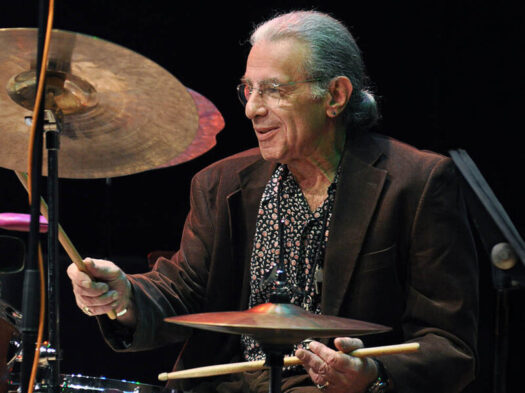Recorded 1977 for Muse. Barry Altschul, drums and percussion; Sam Rivers, saxophones and flute; George Lewis, trombone; Muhal Richard Abrams, piano; Dave Holland, bass. Four pieces credited to Altschul; one apiece to Abrams and Carla Bley.
Barry Altschul turned 79, on January 6, 2022. Altschul was a key player during the second wave of revolutionary jazz. More often than not, Dave Holland was the bassist; depending on how you count it, there are 30 or 40 sessions with Holland and Altschul holding down the churn. Notable discs include Circle Paris Concert, Braxton New York, Fall 1974, Holland Conference of the Birds, and Rivers The Quest.
You Can’t Name Your Own Tune is perhaps less-well known, but for no good reason, as it’s really an incredibly listenable session of the finest exponents of this rather hectic style. This is a one-off quintet, but everyone brings their A-game. In some ways it could pair with the early Tony Williams quintet session Spring, also with Sam Rivers. In both cases the drummer decides which directions an “out” date should take, with notably stylish results.
The title track dives right in. Sometimes medium-up swing time with no changes, especially when it is more dissonant than the Ornette Coleman version, is called “free-bop.” Not sure if that is truly a canonical genre or not, but at any rate this is a wonderful example. The charging head is charismatic, and then the solos are frankly amazing. I’ve rarely heard Rivers, George Lewis, or Muhal Richard Abrams playing quite like this: Head-solos-head, a knowledgable rhythm section, and flat-out atonal “jazz” blowing.
“For Those That Care” is a soulful piece of through-composed melodic counterpoint. Holland is on arco, Rivers on flute doubles Lewis. It moves morosely along, breaking apart for collective mourning. It’s all natural, Altschul’s de-constructed brushwork is hot in the mix.

“Natal Chart” surprises with a mix of disparate compositional elements. Partly it’s a literal triplet chatter, partly it’s a swing band gone very, very wrong. The blowing is noisy collective. A little of this goes a long way, especially on record, but the track is short (less than four minutes) and they bring it home with a fake old-timey ending. Bravo.
Muhal Richard Abrams brought an intense trio piece to the date, “Cmbeh.” A thorny head leads into crazy free-bop. If I heard this in a blindfold test, I’d have no idea who the pianist was, but I would want to hear more of them. A lot more. Part of the charm is definitely Holland and Altschul together, they had truly figured out a way to play this tempo that was both fierce and liquid. Holland’s bass solo is great, too. Maybe because it’s the drummer’s date, it feels like the bass and drums are both captured better than on other ’70s sessions with a similar cast and vibe.
Amusingly, Altschul calls his solo track, “Hey, Toots!” March cadences interact with “random” percussion and the eerie Waterphone. The Waterphone was patented in 1973, I suspect this is one of the earlier instances of it being used on a jazz record. The one gong hit is fabulous.
The LP concludes with a classic Carla Bley line, “King Korn.” Altschul played a lot of Carla Bley rep with Paul Bley on several important trio dates; the first time on record is on the only Paul Bley album with Holland and Altschul, Synthesizer Show.
This must be the only occasion Muhal Richard Abrams is documented playing Carla Bley. Interestingly, Abrams features her lines and harmonic concept quite literally in his accompaniment and solo feature. It’s still very abstract of course, but “King Korn” can be heard in there from the piano more often than not. Rivers and Lewis also play at an amazingly high level of fevered, noisy joy. Now, why didn’t this band make a record of Carla tunes? Oh well, at least we have Barry Altschul’s debut album as a leader, the first rate You Can’t Name Your Own Tune.
:format(webp):mode_rgb():quality(90)/discogs-images/R-2042141-1260538430.jpeg.jpg)






More Stories
CD review: George Benson – Dreams Do Come True: When George Benson Meets Robert Farnon – 2024: Video, CD cover
The band was tight as ever. The Warren Haynes Band cuts loose: Video, Photos
Interview with Alvin Queen: Feeling Good – I heard these tunes played by … Video, new CD cover, Photos